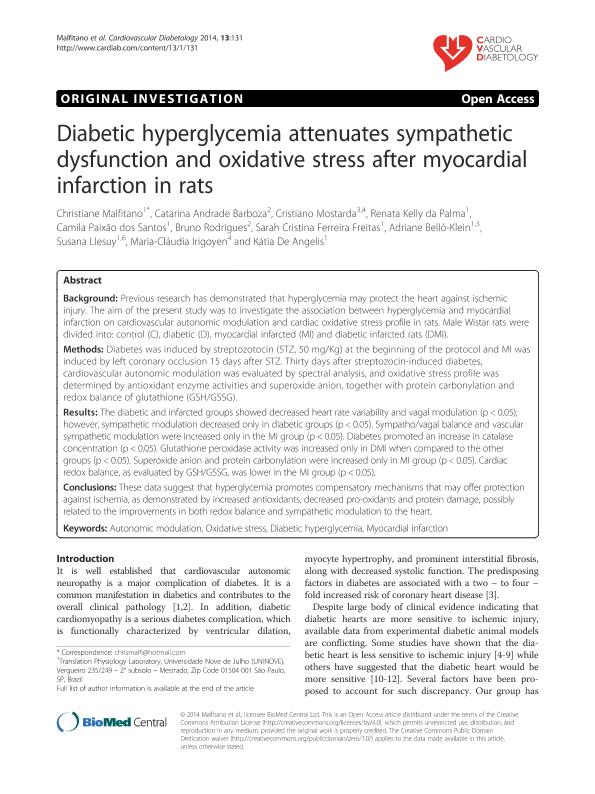Artículo
Diabetic hyperglycemia attenuates sympathetic dysfunction and oxidative stress after myocardial infarction in rats
Malfitano, Christiane; Andrade Barboza, Catarina de; Mostarda, Cristiano; Palma, Renata Kelly da; Santos, Camila Paixão dos; Rodrigues, Bruno; Ferreira Freitas, Sarah Cristina; Belló Klein, Adriane; Llesuy, Susana Francisca ; Irigoyen, Maria Cláudia; De Angelis, Kátia
; Irigoyen, Maria Cláudia; De Angelis, Kátia
 ; Irigoyen, Maria Cláudia; De Angelis, Kátia
; Irigoyen, Maria Cláudia; De Angelis, Kátia
Fecha de publicación:
10/2014
Editorial:
BioMed Central
Revista:
Cardiovascular Diabetology
ISSN:
1475-2840
Idioma:
Inglés
Tipo de recurso:
Artículo publicado
Clasificación temática:
Resumen
Background: Previous research has demonstrated that hyperglycemia may protect the heart against ischemic injury. The aim of the present study was to investigate the association between hyperglycemia and myocardial infarction on cardiovascular autonomic modulation and cardiac oxidative stress profile in rats. Male Wistar rats were divided into: control (C), diabetic (D), myocardial infarcted (MI) and diabetic infarcted rats (DMI). Methods: Diabetes was induced by streptozotocin (STZ, 50 mg/Kg) at the beginning of the protocol and MI was induced by left coronary occlusion 15 days after STZ. Thirty days after streptozocin-induced diabetes, cardiovascular autonomic modulation was evaluated by spectral analysis, and oxidative stress profile was determined by antioxidant enzyme activities and superoxide anion, together with protein carbonylation and redox balance of glutathione (GSH/GSSG). Results: The diabetic and infarcted groups showed decreased heart rate variability and vagal modulation (p < 0.05); however, sympathetic modulation decreased only in diabetic groups (p < 0.05). Sympatho/vagal balance and vascular sympathetic modulation were increased only in the MI group (p < 0.05). Diabetes promoted an increase in catalase concentration (p < 0.05). Glutathione peroxidase activity was increased only in DMI when compared to the other groups (p < 0.05). Superoxide anion and protein carbonylation were increased only in MI group (p < 0.05). Cardiac redox balance, as evaluated by GSH/GSSG, was lower in the MI group (p < 0.05). Conclusions: These data suggest that hyperglycemia promotes compensatory mechanisms that may offer protection against ischemia, as demonstrated by increased antioxidants, decreased pro-oxidants and protein damage, possibly related to the improvements in both redox balance and sympathetic modulation to the heart.
Archivos asociados
Licencia
Identificadores
Colecciones
Articulos(IBIMOL)
Articulos de INSTITUTO DE BIOQUIMICA Y MEDICINA MOLECULAR
Articulos de INSTITUTO DE BIOQUIMICA Y MEDICINA MOLECULAR
Citación
De Angelis, Kátia; Irigoyen, Maria Cláudia; Llesuy, Susana Francisca; Belló Klein, Adriane; Ferreira Freitas, Sarah Cristina; Rodrigues, Bruno; et al.; Diabetic hyperglycemia attenuates sympathetic dysfunction and oxidative stress after myocardial infarction in rats; BioMed Central; Cardiovascular Diabetology; 13; 131; 10-2014; 1-9
Compartir
Altmétricas



